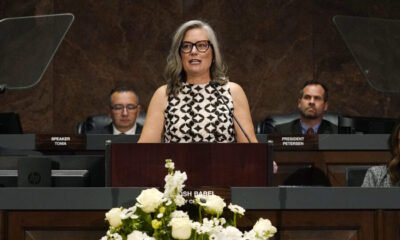ATM
Gov. Hobbs Unveils New Cryptocurrency Regulations and Reserve Fund

New legislation in Arizona aims to create a regulatory framework for cryptocurrency, focusing on the establishment of a cryptocurrency reserve fund and regulating kiosk operators.
On May 7, Governor Katie Hobbs signed a pivotal bill that allows the state to manage unclaimed digital currency assets through the proposed reserve fund. This legislation is part of a broader initiative to address the increasing prevalence of cryptocurrency among individuals and businesses.
Among the newly enacted laws, one will regulate cryptocurrency ATM operators, aiming to shield users from scams and preventing municipalities from imposing restrictions on computational power within homes.
Rep. Jeff Weninger, R-Chandler, was instrumental in introducing the legislation. His measures update Arizona’s unclaimed property laws to encompass cryptocurrency and enable the establishment of a Bitcoin and digital assets reserve fund to optimize investment returns.
With legislative approval, the state treasurer can allocate 10% of these digital assets into the state general fund. The law permits the transfer of abandoned digital assets to the Department of Revenue in their original form, negating the need for liquidation into cash.
“This law ensures Arizona doesn’t leave value sitting on the table,” Weninger stated in a May 7 press release. “We are positioning ourselves to lead the country in how we secure, manage, and ultimately benefit from abandoned digital currency.”
Stephen Cole, CEO of Orqestra, remarked that the law establishes a foundational reserve of seized digital assets. He advocates for expanding the law to enhance the state’s investment capabilities in digital assets.
“The current limitations mean investment managers have minimal discretion over how much to invest, so we may see other states permitting broader allocations,” Cole said.
While the legislation garnered bipartisan support, some Democrats expressed concerns. Sen. Mitzi Epstein, D-Tempe, cautioned against the creation of cryptocurrency reserves, suggesting it could artificially inflate the market prices of digital currencies like Bitcoin.
“This approach risks propping up the price of Bitcoin, which is unwise,” she asserted. Epstein, skeptical of the cryptocurrency’s volatility, characterized it as resembling a ponzi scheme.
Epstein did support another recent bill regulating cryptocurrency ATM operators, introduced by Rep. David Marshall, R-Snowflake, in response to scams targeting seniors.
The law mandates that operators disclose transaction terms, provide receipts, and allow for refunds within 72 hours. Furthermore, it restricts new customers to transactions below $2,000 per day.
Marshall noted the potential for confusion in the cryptocurrency market, especially among seniors, highlighting the necessity of these protective regulations.
Cole believes that a well-defined regulatory framework is essential to combat scams but emphasizes that such incidents should not deter innovation in the rapidly evolving cryptocurrency landscape.
“Those who are reluctant to adopt cryptocurrency will ultimately catch up but may miss out on significant opportunities,” he added.








![Members of the Arizona House of Representatives vote during a third reading of nearly three dozen bills at the Arizona State Capitol on March 4, 2025. [Monica D. Spencer]](https://arizonanews.org/wp-content/uploads/2025/06/SR-347-Secures-53M-in-Third-State-Budget-Draft-Awaiting-400x240.jpg)
![Members of the Arizona House of Representatives vote during a third reading of nearly three dozen bills at the Arizona State Capitol on March 4, 2025. [Monica D. Spencer]](https://arizonanews.org/wp-content/uploads/2025/06/SR-347-Secures-53M-in-Third-State-Budget-Draft-Awaiting-80x80.jpg)








